
ICAS Bulletin (online ISSN 2836-3418, print ISSN 2836-340X) is published every other week throughout the year at 1919 M St NW, Suite 310, Washington, DC 20036.
The online version of ICAS Bulletin can be found at chinaus-icas.org/bulletins/.
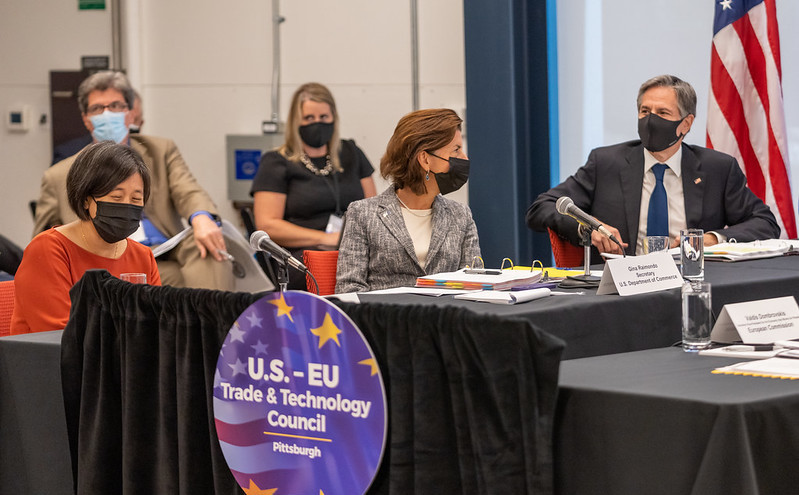
– On October 4, U.S. Trade Representative Katherine Tai unveiled the results of a month-long review of China trade policy, revealing that the U.S. would exclude only some Chinese imports from existing tariffs and will push for a top-level meeting to address China’s failure to comply with measures of the 2020 ‘Phase 1’ trade deal.
– On September 29, the first U.S.-EU Trade and Technology Council was held in Pittsburgh where top officials pledged to coordinate policy on market rules, standards, and enforcement actions against unfair trade practices.
– On September 24, Commerce Secretary Gina Raimondo stated that the Biden administration will continue to support U.S. market access and business ties to China despite Washington’s increasing concern over U.S.-China technology and trade exchanges.
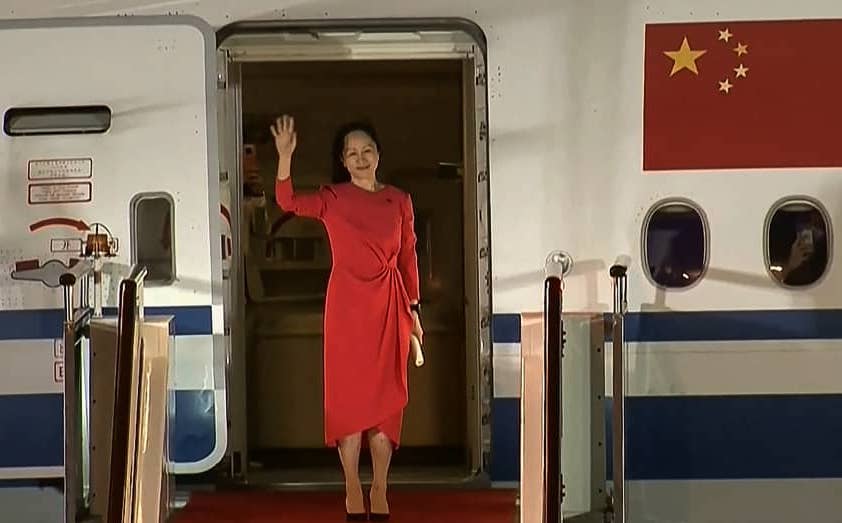
– On September 28, China released American siblings Victor and Cynthia Liu—the children of Liu Changming, a fugitive wanted in China on fraud charges who was formerly the top party official at the Guangzhou branch of China’s state-owned Bank of Communications—from a three-year ban on exiting the country.
– On September 24, Huawei’s CFO Meng Wanzhou left her three-year house arrest in Vancouver and returned to China after reaching a deferred prosecution agreement with the U.S. Justice Department in her fraud case. China reciprocated within hours, releasing detained Canadians Michael Spavor and Michael Kovrig who were being held on espionage charges.

– On October 2, Securities and Exchange Commission chair Gary Gensler stated that a three-year countdown has started on delisting Chinese companies that refuse to have their audit records reviewed by U.S. regulators. The statement came after the Public Company Accounting Oversight Board adopted a framework to more quickly assess the legality of reviewing public audits in China, which prohibits foreign audits of its business entities without prior approval.
– On September 28, David Lipton—senior counselor to Treasury Secretary Janet Yellen—participated in a roundtable meeting with the Governor of the People’s Bank of China and several representatives of the U.S. business community.
– On September 21, Alan Estevez—Biden’s nominee to serve as Under-Secretary of Commerce for Industry and Security—testified before the Senate that he views Huawei as a national security threat and that he would expect to keep the firm blacklisted unless “things change.”

– On October 1, China’s Ministry of Industry and Information Technology announced a new system of data categorization that would bar all industrial and telecoms data deemed ‘core’ from leaving China.
– From September 26–30, several Apple and Tesla chip and circuit suppliers in China suspended operations to comply with tightening carbon energy consumption standards.
– On September 24, the People’s Bank of China stated that all domestic and overseas cryptocurrency-related activities were illegal for Chinese financial institutions to process.
– On September 24, a research paper indicated that the U.S. tariffs on Chinese products implemented in mid-2018 did little to bring U.S. companies home or change Chinese economic policy.
– On September 23, a survey conducted by the American Chamber of Commerce in Shanghai showed that U.S. companies’ optimism about conducting business in China reached a three-year high.
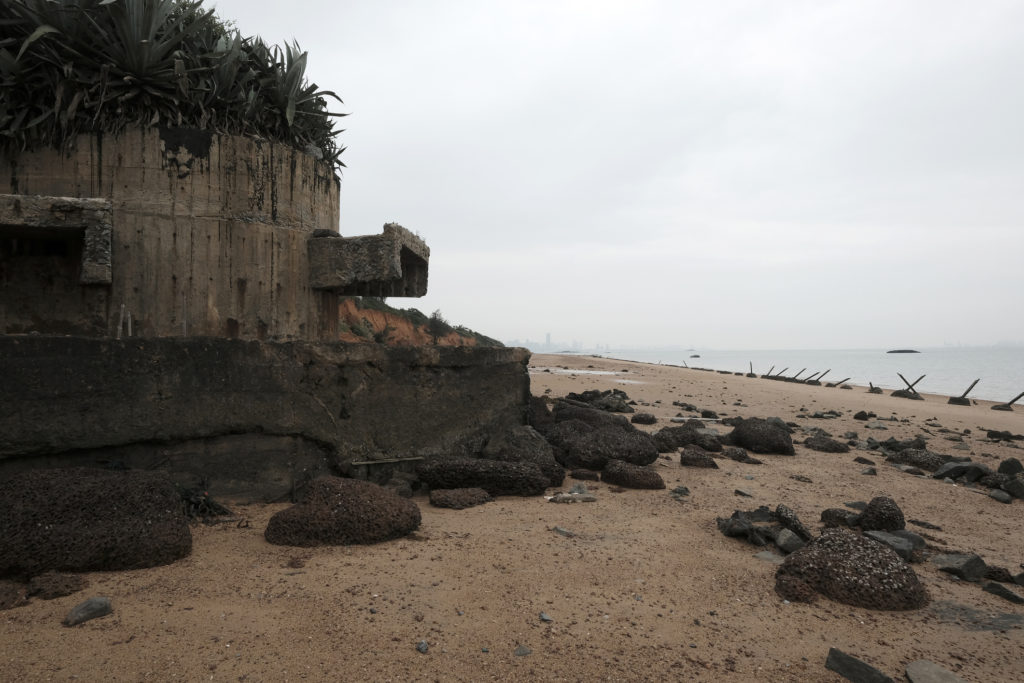
– On October 5, it was reported that National Security Advisor Jake Sullivan plans to meet with Yang Jiechi—China’s top diplomat on the Politburo Standing Committee—this week to address rising tensions between the two states over issues of Taiwan and trade policy.
– On October 3, the U.S. accused China of “provocative military activity” after it flew an unprecedented number of military planes near Taiwan’s airspace amid its National Day celebrations. The following day, White House Press Secretary Jen Psaki urged China to “cease its military, diplomatic, and economic pressure and coercion against Taiwan” in a press conference.
– On September 24, the first in-person meeting of the Quad concluded with members pledging to pursue a free and open Indo-Pacific region “undaunted by coercion.”
– On September 22, Malaysia stated that it would consult China before formulating a policy towards AUKUS.

September 20 hosted by Carnegie Endowment for International Peace
September 20 hosted by Center for Strategic and International Studies
September 29 hosted by Wilson Center
September 29 hosted by German Marshall Fund
October 4 hosted by Wilson Center
October 4 hosted by Center for Strategic and International Studies
October 5 hosted by Atlantic Council
October 7 hosted by SupChina
October 7 hosted by Center for Strategic and International Studies
October 8 hosted by Center for Strategic and International Studies
October 12 hosted by Washington State China Relations Council
October 12 hosted by National Bureau of Asian Research
October 21 hosted by SupChina
November 4 hosted by Wilson Center
Tuesday, September 28, 2021
10:00am – 11:45am EDT
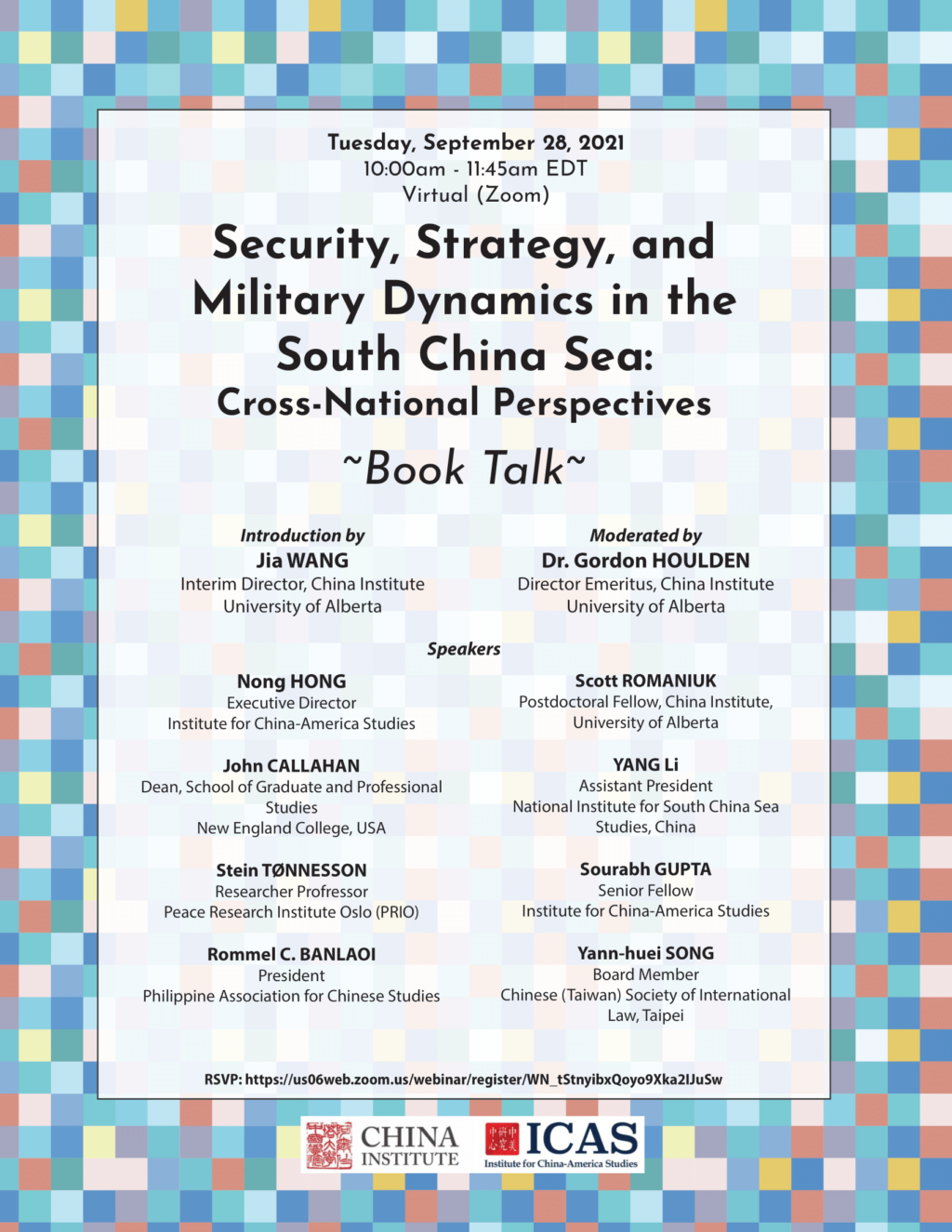
Last Tuesday, ICAS partnered with the China Institute at the University of Alberta to host a discussion with the various co-authors of a newly published book on the South China Sea. A summary and a video recording of the event will be available online soon from the event page.
The comprehensive volume Security, Strategy, and Military Dynamics in the South China Sea: Cross-National Perspectives brings together the expertise and knowledge of more than a dozen academics and professionals, all of whom are leading experts in their respective areas. Engaging with individual states and core themes, this book collectively presents a robust and sweeping outlook on the current geography of security and potential conflict in the South China Sea.
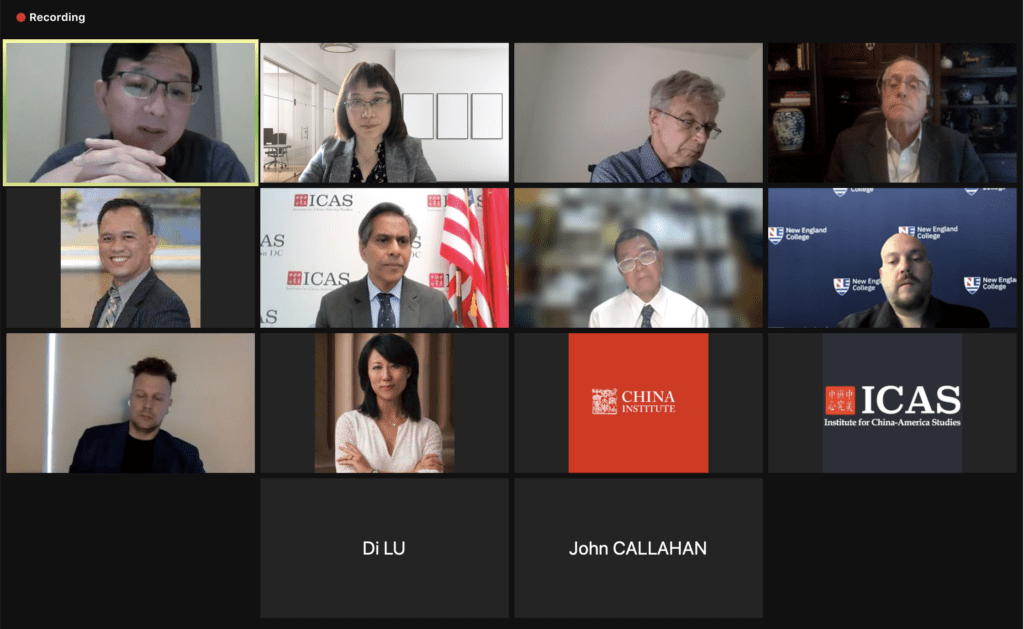
by Nong Hong
September 25, 2021
China has made significant investments in Antarctica and has become an active participant in Antarctic governance. Its activities in Antarctica in particular appear to be designed to ensure that China will not be left out should there be beneficial opportunities in Antarctica in the future. In some Western narratives, China has become a so-called ‘challenger’ due to their perception of China being ‘aggressive’ in the polar regions. However, this point has its own counter argument based on the common practice of states to actively join international institutions and subsequently update their domestic law-making process. China appears to have taken a two-fold approach in Antarctic governance—being generally both supportive of the Antarctic Treaty System (ATS) and also keen to make its own mark in shaping future development of the ATS in a manner that promotes China’s interests. The outcomes of China’s polar investments may well bring as much benefit to itself as to many other interested players. It is important that China continues to support current norms that promote cooperation and limit competition or challenge them…
This article was originally released on September 25, 2021 in Science Direct and is in pre-print for the December volume of the Marine Policy journal.
by Nong Hong
September 30, 2021
Renowned Chinese sailor Zhai Mo and two crew members embarked on a four-month voyage beginning at the end of June this year, attempting to circumnavigate the Arctic for the first time in human history. However, Canada stopped their sailboat in the Arctic Ocean near Lancaster Sound, a part of the Northwest Passage.
This voyage does not challenge Canada’s sovereignty or legal status over the Northwest Passage as claimed by a report on the Canadian Broadcasting Corporation (CBC). One of the issues that worry Canada the most is whether China will adopt the same legal position as the United States and the European Union: treating the Northwest Passage as a “strait for international use” in opposition to Canada’s claim to it as “internal waters.”
In its Arctic Policy White Paper in 2018, China maintains that all activities to explore and utilize the Arctic should be conducted in compliance with treaties such as the United Nations Convention on the Law of the Sea (UNCLOS) and the Svalbard Treaty, as well as with general international law. However, the white paper does not touch on the status of the Northwest Passage and other straits in the Arctic, focusing instead on the considerable opportunities and challenges posed by economic and environmental considerations. Hence, of the Arctic five (Canada, Denmark, Norway, Russia and the United States), Canada is the most concerned about the white paper’s implications, warning that China’s Arctic policy is attempting to tread a fine line between respecting the sovereignty of Arctic nations and leaving room to profit from disputes in international law…
This commentary was originally released on the CGTN website on September 30, 2021.
On Friday, October 1, Senior Fellow Sourabh Gupta discussed China’s Air Force modernization and strategic competition with the U.S. in the context of the 2021 Zhuhai Air Show on RT America’s The News with Rick Sanchez.
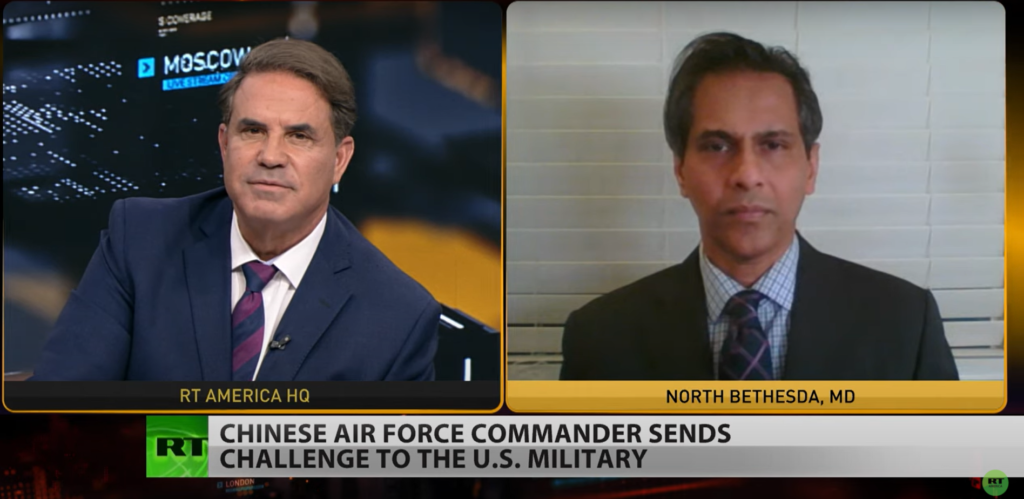
On Wednesday, September 29, Senior Fellow Sourabh Gupta discussed U.S.-China relations in the context of Huawei CFO Meng Wanzhou’s release on CGTN’s World Insight with Tian Wei.
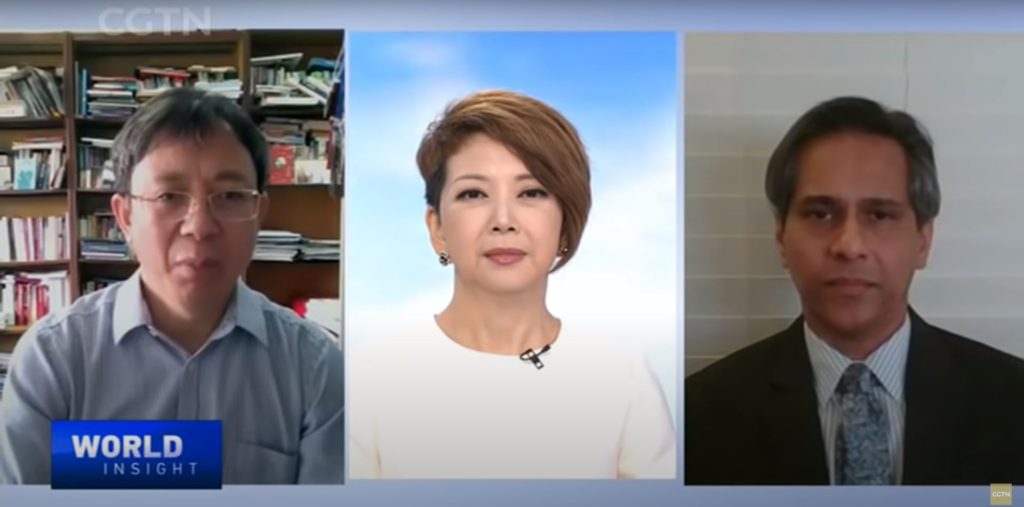
On Saturday, September 25, Executive Director Dr. Nong Hong discussed the implications of China’s growing navy on the BBC World Service.

The Institute for China-America Studies is an independent nonprofit, nonpartisan research organization dedicated to strengthening the understanding of U.S.-China relations through expert analysis and practical policy solutions.
1919 M St. NW Suite 310,
Washington, DC 20036
icas@chinaus-icas.org
(202) 968-0595
© 2025 INSTITUTE FOR CHINA-AMERICA STUDIES. ALL RIGHTS RESERVED.